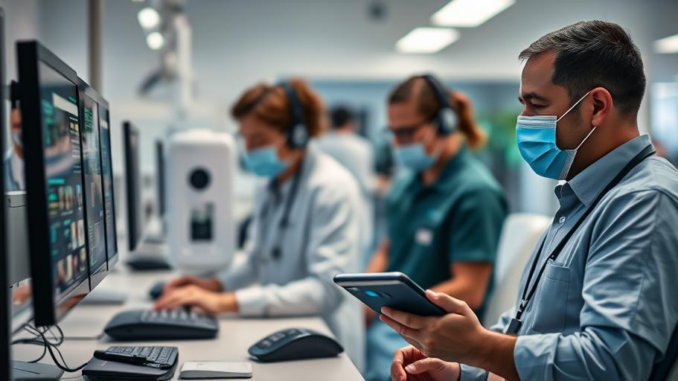
Summary
This article explores the transformative impact of ambient listening technology in ENT practices. It discusses how this innovative tool enhances efficiency, reduces reliance on scribes, and improves patient care. The article also highlights the experiences of Albany ENT & Allergy Services, which successfully implemented ambient listening technology.
Main Story
Okay, so ambient listening tech is really shaking things up in healthcare, especially for ENT practices. I mean, think about it: doctors spend so much time on paperwork these days, it’s almost criminal. This tech, it’s basically a smart way to record and transcribe those patient chats in real-time, automating the whole documentation thing. That means less manual note-taking and, crucially, more time for, you know, actual patient care. Let’s dive into how it’s helping ENT practices out.
Boosting Efficiency – Say Goodbye to Scribes?
One of the biggest wins here is the efficiency boost. I heard about Albany ENT & Allergy Services, they were early adopters of this stuff, and they’re projecting an 11-13% jump in provider efficiency. That’s huge! Think about what you could do with an extra 10% of your time each day. Seriously. It’s more time with patients, less stress, especially in a high-volume specialty like ENT. And what about medical scribes? Well, this tech is looking to replace them as well. It automates the process, so it can really cut down on overhead costs associated with scribes, and allowing you to reallocate funds within the practice. Albany ENT & Allergy Services is even expecting to reduce their full-time scribe needs by roughly 0.4-0.49 per provider. Think of the money saved. Then you can use that cash for more patient focused services.
Improving Patient Care, Reducing Burnout
But it’s not just about efficiency; it’s about better care. If the computer handles the typing, clinicians can actually focus on the patient, building a stronger connection. And let’s be honest, a focused, attentive doctor is more likely to make a accurate diagnosis, right? And that leads to better treatment plans and happier patients.
Let’s not forget about burnout! It’s a real issue in healthcare, I’ve seen friends and family just simply run out of steam, and all the admin work only makes that worse. With ambient listening, doctors spend less time on paperwork after hours—less “pajama time,” as they call it. That leads to a better work-life balance, less stress, and happier, more engaged doctors. In theory, at least. I imagine the reality is more nuanced, but still promising.
Implementation is Key
Albany ENT & Allergy Services seems to have nailed the integration of the tech into their workflow. In fact, it was the NextGen Ambient Assist system that they selected. The system simply captures patient conversations and transcribes them into detailed notes right inside their EHR. Apparently, they generated over 2,000 ambient notes during the beta phase, showcasing its reliability and scalability. Not bad huh?
Of course, implementing any new tech takes careful planning and integration is crucial. Make sure it fits your needs. The integration must be seamless into your EHR. Train your staff adequately too. If you don’t the entire project will fail. And really, don’t forget the patients – make sure the tech is enhancing their experience, not detracting from it, so that you can hopefully strengthen trust and improve the overall quality of care. Even though adopting the new technology may be challenging, the long-term benefits for both providers and patients make the transition worthwhile. It’s worth the effort.
So, is ambient listening the future of healthcare? I think it certainly has the potential to be a game-changer, especially in specialties like ENT, but it’s not a magic bullet. It needs to be implemented thoughtfully and with a clear focus on improving both efficiency and patient care, or else the new tech is just a shiny paperweight.


So, doctors ditching “pajama time” for actual sleep? If ambient listening can truly cut down on after-hours charting, maybe they’ll finally have time to binge-watch that medical drama they’ve been missing. Wonder if they will critique it for accuracy?